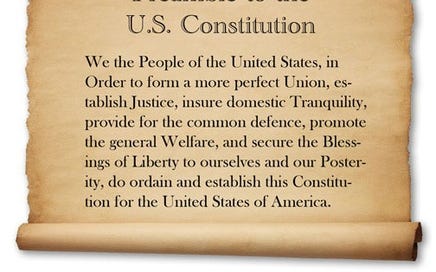Issue #47: Government
By Pamela Hilliard Owens
We the People of the United States, in Order to form a more perfect Union, establish Justice, insure domestic Tranquility, provide for the common defence, promote the general Welfare, and secure the Blessings of Liberty to ourselves and our Posterity, do ordain and establish this Constitution for the United States of America.
When I was in elementary school, I was skipped from the 3rd grade to the 5th grade. Because my birthday is at the end of October, I was already younger than many of my classmates, so in 5th grade, I felt, and I was, really young.
At the time I was in elementary school in Detroit, we had a class called “Auditorium,” which was held in the—wait for it—auditorium! As I remember, we learned all kinds of things that had to do with (Western) culture, government (although we also had social studies class), and a mishmash of other lessons, like the school spelling bee. Go figure.
That was also the first time I had a Black male teacher. I only had a Black male teacher once more in my entire school career through graduate school, the print shop teacher in 7th grade.
Please read to the end to see important information about commenting, sharing, and subscribing. Thanks!
Anyway, I very clearly remember when we were assigned to memorize the Preamble to the Constitution. I went home and looked it up in our encyclopedia and immediately started crying. To my young mind, and with the small print in the encyclopedia, it seemed so long and had such “big” words.
My father took out a yellow legal pad and wrote out the Preamble sentence-by-sentence. It was only fifty-two words and eight phrases, and my father assured me that I could memorize it, and I did!
Because of my Dad, the experience turned out to be so successful and so memorable, that decades later, when I taught government to 8th grades, I also had them memorize the Preamble. The students at that particular school were performing arts students, and instead of just reciting the Preamble, they performed the assignment in different ways. Some of them turned it into a rap song, some of them debated it, some of them made a modern dance, and one student, who was an excellent artist, just looked at one of the famous drawings of the Founders and drew the same picture with colored pencils. It was much more fun than I had in 5th grade!
Each phrase of the Preamble has an important meaning
For all of the personal faults of the Founders: many of them were slaveholders, adulterers, racists, criminals of some kind (especially considering they were still technically British subjects before the Revolutionary War), etc., they were also highly educated and brilliant attorneys, and were very intentional in the wording for each element of the Constitution, including the Preamble.
The Preamble is more than just an “introduction” to the Constitution. While it cannot itself enforce government powers or citizens’ rights, the Preamble declares that the enacting of the provisions of the Constitution will be the fundamental and foundational law of the United States of America.
We the People of the United States The Constitution was a replacement for the Articles of Confederation, which turned out to be a configuration that emphasized individual “states rights” instead of one united and unified nation. Additionally, the People are in charge of the government, not some monarch-like or military-type figurehead.
…in order to form a more perfect union… …more “perfect” than British colonialism, and more “perfect” than different nation-states competing with each other.
…establish Justice… our justice system is supposed to be fair and equal, and of course, we’re still working on that.
…insure domestic Tranquility… again the intent was to maintain peace within the borders of the new country. With domestic terrorist acts against American citizens throughout the centuries since our founding, we’re still working on this goal too.
…provide for the common defence (British spelling)… defending the country against any threats, foreign and domestic. That is why the phrase in the oath of office sworn by the incoming president is so important: “…will to the best of my ability, preserve, protect and defend the Constitution of the United States.”
Treason is the only crime expressly defined by the Constitution and is applied to any American official who betrays their sworn allegiance to the Constitution, not whatever political “offense” someone thinks up. Executing an insurrection to overthrow the government or to keep Congress from implementing a Constitution activity such as counting the official Electoral College votes and therefore preventing the peaceful transition of power can be considered treason and sedition. (Of course, I am not a lawyer, nor do I play one on TV.)
…promote the general Welfare… supposedly general or universal challenges such as poverty, housing, food, and other economic and social welfare issues were important enough to be mentioned as a goal of the Constitution.
…secure the blessings of blessings of Liberty for ourselves and our Posterity securing the blessings of liberty refers to the preservation of the rights and freedom of each citizen (not just some citizens) and those rights and freedom are duly preserved for themselves and the sake of posterity.
…do ordain and establish this Constitution for the United States of America. the preamble ordains or orders the delegation of powers to the new nation that would be established by the Constitution.
The Preamble is the foreword of the legal document (the Constitution) that follows it. It details the understood facts, the intentions, and the goals of those who wrote it. The word “democracy” does not appear in the preamble, because it is inherently understood that the government, as stated by President Abraham Lincoln decades later, was “of, for, and by the People.”
What we actually have is not really a pure democracy, but a constitutional federal republic, if, as a quote often attributed to Benjamin Franklin, we can keep it.




